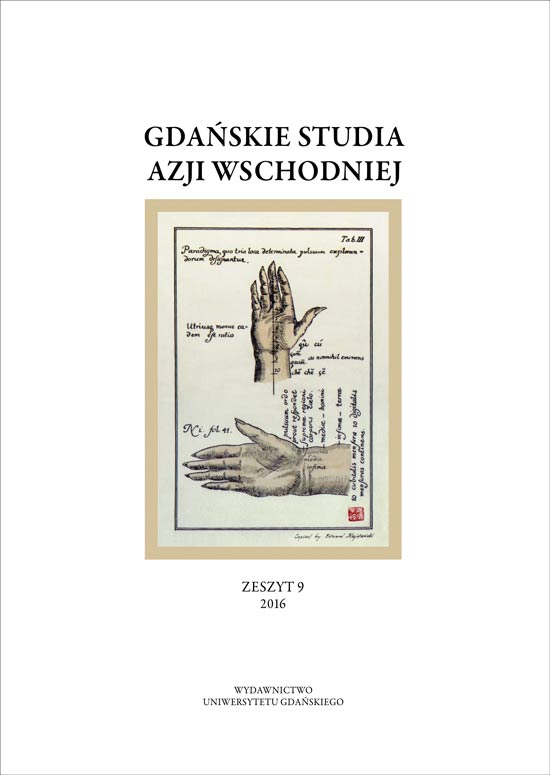Miękka siła jako narzędzie polityki zagranicznej Chińskiej Republiki Ludowej i Republiki Korei
Abstrakt
The article focuses on the issue of soft power in two Asian countries – People’s Republic of China and the Republic of Korea. These countries differ significantly in size not only territorial but also military and economic, yet have much in common in culture and history, as well as in the active use of public diplomacy. The Article aims to briefly introduce the use and tools of soft power in both countries, and compare them, paying attention to both the deficiencies and successfully conducted operations of Seoul and Beijing.
Downloads
Bibliografia
J.S. Nye, Przyszłość siły, Warszawa 2012
J.S. Nye, Soft Power. Jak osiągnąć sukces w polityce światowej, Warszawa 2007
B. Ociepka, Nowa dyplomacja publiczna – perspektywa teorii stosunków międzynarodowych i komunikowania politycznego, „Przegląd Strategiczny” 2012, nr 1
B. Ociepka, Miękka siła i dyplomacja publiczna Polski, Warszawa 2013
J.C. Ramo, The Age of Unthinkable, New York 2009
Democracy Index 2014. Democracy and its discontents. A report from The Economist Intelligence Unit, The Economist Intelligence Unit Limited 2015, London 2014
D.E. Zheng, China’s use of soft power in the developing world. Strategic intentions and implications for United States [w:] Chinese soft power and its implications for United States. Competition and cooperation in the developing world. A report of the CSIS Smart Power Initiative, ed. C. McGifert, Washington 2009
B.S. Glaser, M.E. Murphy, Soft power with Chinese characteristics. The ongoing debate [w:] Chinese soft power and its implications for United States. Competition and cooperation in the developing world. A report of the CSIS Smart Power Initiative, ed. C. McGifert, Washington 2009
J. Kurlantzick, Charm Offensive. How China’s soft power is transforming the new world, Yale 2007
China’s back, http://www.economist.com/news/finance-and-economics/21623758-chinas-back (dostęp: 10.01.2015).
Wardęga J., Chiński nacjonalizm. Rekonstruowanie narodu w Chińskiej Republice Ludowej, Kraków 2014
D. Shambaugh, China goes global. The Partial Power, New York 2013.
M. Barr, Who’s afraid of China. The challenge of Chinese soft power, London–New York 2011
I. D’Hooghe, Public diplomacy in the People’s Republic Of China [w:] The New Public Diplomacy. Soft Power in International Relations, red. J. Melissen, New York 2005
J. Bender, Ranked: The World’s 20 strongest militaries, http://uk.businessinsider.com/these-are-the-worlds-20-strongest-militaries-ranked-2015-9 (dostęp: 11.01.2016).
D. Shim, P. Flamm, Rising South Korea: A Minor Player or a Regional Power, „German Institute of Global and Area Studies Working Papers” 2012, no. 200
S. Lee, South Korean Soft Power and How South Korea Views the Soft Power of Others [w:] Public Diplomacy and Soft Power in East Asia, red. S. Lee, J. Melissen, New York 2011
T. Huh, The Republic of Korea’s Public Diplomacy as a Policy Tool of Soft Power, „USC Center on Public Diplomacy” 2012, vol. 3, issue 2, https: uscpublicdiplomacy.org (dostęp: 16.04.2016).
Y. Ma, J. Song, D. Moore, Korea’s Public Diplomacy: A New Initiative for the Future, „The Asan Insititue for Policy Studies. Issue Brief” 2012, no. 39
G. Lee, A Theory of Soft Power and South Korean Soft Power Strategy, „Korean Journal of Defense Analysis” 2009, vol. 21, no. 2, s. 12.
T. Kim, Paradigm Shift in Diplomacy: A Conceptual Model for Korea’s “New Public Diplomacy”, „Korea Observer” 2012, vol. 43, no. 4
S. Lee, Soft Power and Korean Diplomacy. Theory and Reality, http://www.eai.or.kr/data/bbs/kor_report/ 2009090911303012.pdf, s. 19 (dostęp: 11.01.2016).
M. Fuhr, Globalization and Popular Music in South Korea. Sounding Out K-Pop, New York–London 2016
A. Tebay, Kakao partners with the Korean government to launch a joint $27 million startup fund, http://thenextweb.com/asia/2013/04/29/kakao-partners-with-the-korean-government-to-launch-a-joint-27-million-startup-fund/ (dostęp: 11.01.2016).
S. Epstein, „Into the New World: Girls’ Generation from the local to the global [w:] K-pop – the International Rise of the Korean Music Industry, eds. JungBong Choi, Roald Maliangkay, New York–London 2015
J. Kim, Despite not being Johnny’s: the cultural impact of TVXQ in the Japanese music industry [w:] K-pop – the International Rise of the Korean Music Industry, eds. JungBong Choi, Roald Maliangkay, New York–London 2015
Y. Cho, Public Diplomacy and South Korea’s Strategies, „The Korean Journal of International Studies” 2012, vol. 10, no. 2
Webtoons eye overseas markets, http://www.koreaherald.com/view.php?ud=20151104000849 (dostęp: 17.01.2016)
Web fiction sees renaissance, http://www.koreaherald.com/view.php?ud=2015 1022001212 (dostęp: 17.01.2016).
Report on Second China-ROK Diplomacy Forum, http://www.chinapda.org.cn/eng/sszx/t11661 15.htm (dostęp: 17.01.2016).
S. Kim, Girl group triggers China-Taiwan row, http://www.koreatimes.co.kr/www/news/nation/2016/ 01/116_195628.html (dostęp: 17.01.2016).
China denies reports that it banned JYP singers over flag, http://www.koreaherald.com/view.php? ud=20160118001209 (dostęp: 17.01.2016).
B. Baek, K-pop agencies need lessons o cultural differences, http://www.koreatimes.co.kr/www/news/culture /2016/01/201_195626.html (dostęp: 17.01.2016).

 Uniwersyteckie Czasopisma Naukowe
Uniwersyteckie Czasopisma Naukowe





